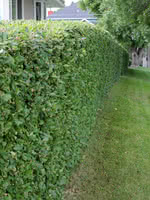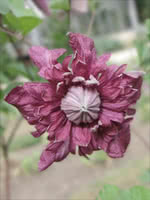Mon-Fri 9am - 5pm Mountain time
Peking Cotoneaster vs Purpurea Plena Elegans Clematis
Cotoneaster acutifolia
Clematis Purpurea Plena Elegans
NOT AVAILABLE THIS SEASON - MIGHT RETURN
NOT AVAILABLE THIS SEASON - MIGHT RETURN
Peking Cotoneaster is a medium-sized shrub that is well adapted to colder climates. Best suited for use as a hedge, Peking Cotoneaster has dark green foliage that turns a stunning reddish orange in the fall.
Hardy fruit guru, Bernie Nikolai (DBG Fruit Growers), has started to recommend grafting hardy pear varieties to Peking Cotoneaster after his experiences were successful and produced fruit faster than other rootstocks. Remember to leave some nurse limbs if you try this.
Purpurea Plena Elegans Clematis (P.P.E) is a stunning climbing vine. The flowers are double flowers, meaning they have an inner pompom surrounded by outer petals. They are distinct dusty rose colour with a long bloom time from mid-summer to early fall. They can remain on the vine for up to three weeks. It is durable and easy to maintain and train.
One of the oldest clematis cultivars, Purpurea Plena Elegans Clematis (P.P.E) is a winner of the Royal Horticultural Society's Award of Garden Merit.
The Purpurea Plena Elegans Clematis will attract pollinators to your yard or garden attracting butterflies and hummingbirds. Because it is a climbing species, support from a trellis or fence is recommended. New vines emerge from the ground, so pruning should be done in early spring.
Peking Cotoneaster Quick Facts
Purpurea Plena Elegans Clematis Quick Facts
In row spacing: 0.3 m (1.0 ft)

